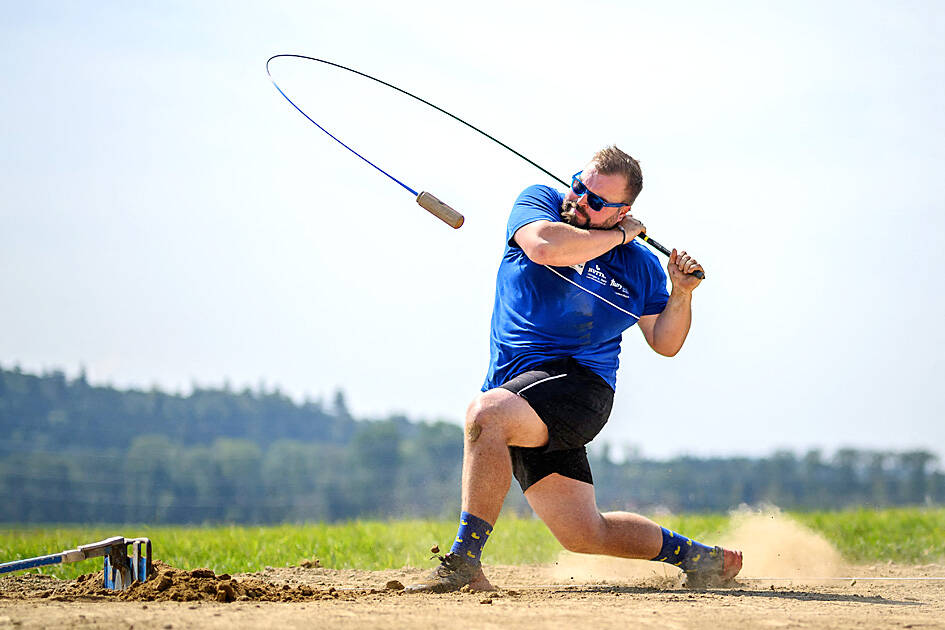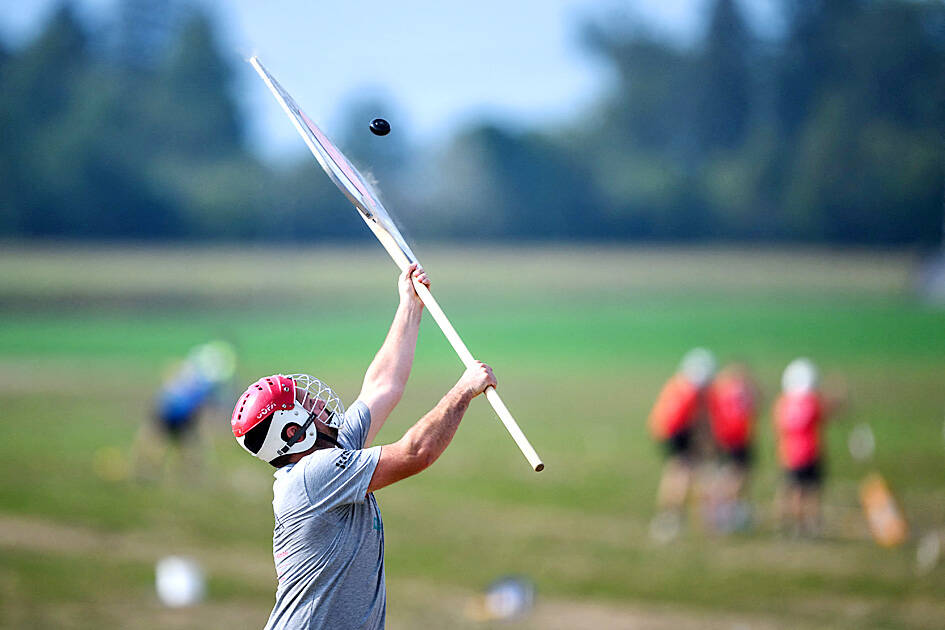Hornussen, a centuries-old Swiss sport where a puck is lashed with a stick sending it flying at speeds of up to 300kph is embracing modernity with each shot now recorded using a smartphone app and clips shared on TikTok.
The quirky sport gets its name from the puck, known as a hornuss or hornet, due to the buzzing sound it makes as it whizzes through the air.
In a game, one side whips the hornuss with a wooden peg on a flexible stick, while the other team, 100m to 300m away, tries to stop it from landing using heavy, flat wooden shovels.

Photo: AFP
Each time it lands untouched, a penalty point is issued to the defending team. The team with the fewest penalties wins.
The amateur sport wrapped up its biggest event in six years earlier this month, when about 4,500 players competed in the 40th Swiss Hornussen Festival.
Outside the village of Hochstetten, teams battled to win a crown of oak leaves, a ceremonial cowbell or a coveted bull’s horn to take back to their clubhouses.

Photo: AFP
With 32 hornussen fields laid out over 60 hectares of farmland, the scene almost resembled a battlefield, with columns of players stretching to the horizon, and the day’s play starting with cannon fire.
“For us, it’s our Olympics,” said Adrian Tschumi, president of Eidgenossischer Hornusserverband (EHV), the national hornussen association.
“It’s not just a game: it’s the family, the surroundings, the party,” he said.
The festival usually takes place every three years, but had not been staged since 2018 due to the COVID-19 pandemic.
The sport is rare in that players of all ages and sexes participate, while individual and team contests run at the same time.
“You can play with children aged 10 or 12, and with their grandfathers who are 80. That’s very special. I don’t know any other sports where three generations can play together,” Tschumi said.
“The magic of the sport: For me, it’s the team. I like to play alongside my son,” he said.
The first written record of hornussen dates from 1564, with the first known competition in 1655. In the 17th century, it was banned on Sundays to stop people skipping church to play.
The sport is mainly played in German-speaking central Switzerland, with its heartland in the Emmental region, east of Bern.
Although “very traditional,” the EHV, formed in 1902, has embraced “modern techniques, with this very cool app,” whereby referees log the scores in real time, Tschumi said.
The sport is also embracing TikTok, with one post by the Studen-Madretsch club viewed more than 14 million times.
About 6,000 registered adults play, including 600 women. There are also 1,300 players younger than 16.
Teams need precise, hard hitters, but also fielders with sharp eyes to pick out the incoming hornuss, read its flight and issue instructions to those further back.
For Barbara Sommer, from the Munchenburchsee-Diemerswil club, the joy of the game is in teamwork.
“I will never win something as a single player, but as a team, if all goes well, we have a chance,” she said.
On the top teams, the players are men aged 20 to 35, athletes bristling with brawn.
Swinging like a golfer, hitters have a flexible, carbon fiber stick up to 3m long.
They whip it round so the wooden block on the end hits the hornuss.
The solid plastic puck flies off the guide rail at dazzling speeds, and rises up to 70m high in the air.
After the game, the teams gather in a giant tent for the convivial prize-giving ceremony, filled with cheers, beers and bull horns.
Now 54, Tschumi recalled playing from the age of 10, the nerves and the childlike sense of fun.
“The feeling doesn’t change,” he said. “I love it.”

The NHL postponed the Los Angeles Kings’ home game against the Calgary Flames on Wednesday with several massive wildfires burning across the greater Los Angeles area. The Kings and Flames were scheduled to play on Wednesday night at the Kings’ downtown arena. The NBA’s Los Angeles Lakers were scheduled to host the Charlotte Hornets in the same arena last night. “Our hearts are with our entire Los Angeles community,” the Kings said in a statement. “We appreciate the hard working first responders who are diligently working to contain the fire and protect our community. We appreciate the league’s support in keeping our

Doping fears prevented former US Open champion Emma Raducanu from treating insect bites on the eve of the Australian Open, she said, with players increasingly wary about ingesting contaminated substances. The British player was speaking in the wake of high-profile doping cases involving Iga Swiatak and Jannik Sinner. “I would say all of us are probably quite sensitive to what we take on board, what we use,” the 22-year-old said, recalling an incident on Friday. “I got really badly bitten by, I don’t know what, like ants, mosquitoes, something. I’m allergic, I guess,” she added. The bites “flared up and swelled up really a

TWO IN A WEEK: Despite an undefeated start to the year playing alongside Jiang Xinyu of China, Wu Fang-hsien is to play the Australian Open with a Russian partner Taiwan’s Wu Fang-hsien yesterday triumphed at the Hobart International, winning the women’s doubles title at the US$275,094 outdoor hard-court tournament, while McCartney Kessler lifted the trophy in the women’s singles. Fourth-ranked Wu and partner Jiang Xinyu of China took 1 hour, 15 minutes to defeat Romania’s Monica Niculescu and Fanny Stollar of Hungary, 6-1, 7-6 (8/6) at the Hobart International Tennis Centre, their second title in a week. Wu and Jiang on Sunday won the women’s doubles title at the ASB Classic in Auckland, beating Serbia’s Aleksandra Krunic and Sabrina Santamaria of the US. Their winning ways continued in Australia as they stretched

EL CLASSICO: La Liga champions Real Madrid would face Barcelona in the Super Cup final tomorrow. Barça secured their final spot after a 2-0 win over Bilbao on Wednesday Real Madrid would chase a record-equaling 14th Spanish Super Cup title in the final against Barcelona after second-half goals by Jude Bellingham and Rodrygo helped them to a 3-0 win over Mallorca in the semi-finals on Thursday. England midfielder Bellingham broke the deadlock after the hour mark with a low shot into the middle of the goal before Mallorca defender Martin Valjent’s own goal doubled the lead in stoppage time followed by a Rodrygo strike from close range. Spanish champions Real are to play Barcelona for the trophy tomorrow after goals by Gavi and Lamine Yamal earned Barça a 2-0 win over